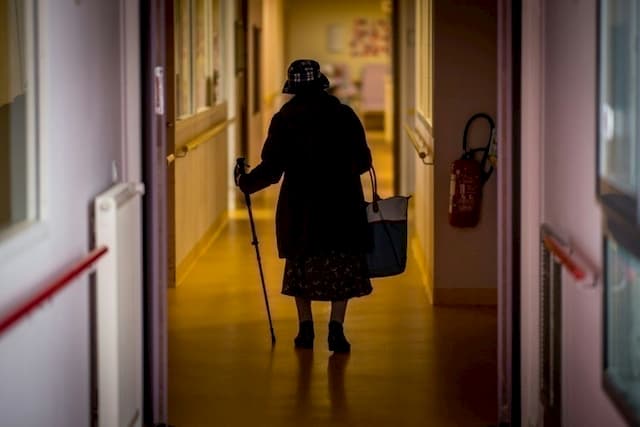Confinement in Ehpad: restore family visits so as not to die of grief

Confined, the elderly suffer from isolation. In order not to allow them to waste away, the professionals request the return, supervised, of family visits.
The confinement in nursing homes protects the elderly against the coronavirus but sometimes leads to a state of distress which can be fatal, hence the importance of restoring family links, insist professionals and patient associations.
The department of Bas-Rhin, in the Grand Est region hard hit by the Coronavirus Covid-19 epidemic, re-authorized Saturday 18th April 2020 visits to residents of accommodation establishments for dependent elderly people (Ehpad), in case per case and in accordance with strict safety instructions.
This decision was welcomed by the Association of Directors of the Service for the Elderly (AD-PA), for whom the State must extend the measure to all establishments, in order to find “a fair balance between the physical and mental health of the elderly ”.
Marie-France is a nurse in a Covid-19 unit of a Hauts-de-Seine nursing home.
“We had two patients who let themselves die of grief. We contacted the families and organized a visit. Since then it’s like they’re coming back”
“Slip syndrome”
“The elderly suffer from isolation. They will be confined for some time, we know. They shouldn’t be even sicker with despair. We must be able to allow visits, ”says Gérard Raymond, president of France Assos Santé, a group of patient associations.
On April 15th, the Academy of Medicine considered that “the moral suffering induced” by the confinement of the elderly should “not be underestimated”.
Gerontopsychologist Angie Cochet mentions the risk of a “slip syndrome” in the elderly.
“Their life objective is to see their family and, in this period, they lose this objective. It is essential that they can maintain the link”
“It is important that the elderly regain some control over their lives, that they have a sense of usefulness (for example, by sending messages of support to the grandchildren), that they can find their place and their posture of elder and no forgotten person, confined to a room which must be looked after continuously, “insists this specialist, who works in a nursing home in Ferté-Saint-Aubin (Loiret) welcoming patients suffering from neurodegenerative disorders.
“We have residents who need landmarks: the staff who look after them are familiar to them and know their lifestyle well, we have set up Skype sessions with families with whom photos and emails are exchanged”
“No discrimination”
This psychologist also makes weekly contact with relatives. “We have families who, because of their parent’s pathology, were very present, some coming every afternoon. The goal is to be able to support them, accompany them, ”she explains.
Clémence is an occupational therapist in two nursing homes in Occitanie, where her job is to help the elderly to maintain their independence for everyday activities.
“We have people who find it difficult to situate themselves in time. Some believe they were in the 1960s. Not seeing their family prevents them from anchoring themselves in reality”
The general director of the group of Korian retirement homes, Sophie Boissard, called for the restoration of a “minimum of social ties between (the) residents and their relatives”, in Le Figaro on Thursday.
“It could be outdoor visits, outside the walls, why not in the presence of volunteers who would be tested. We have to think about it house by house”
On Friday, the Elysée Palace announced that Emmanuel Macron “did not (wish) to discriminate” against the elderly in the context of the progressive deconfinement after May 11.
Enjoyed this? Get the week’s top France stories
One email every Sunday. Unsubscribe anytime.


